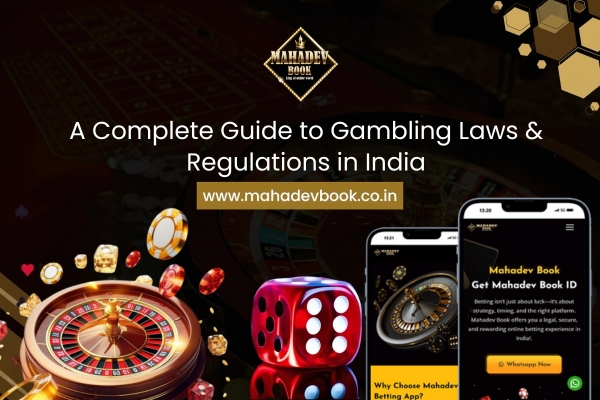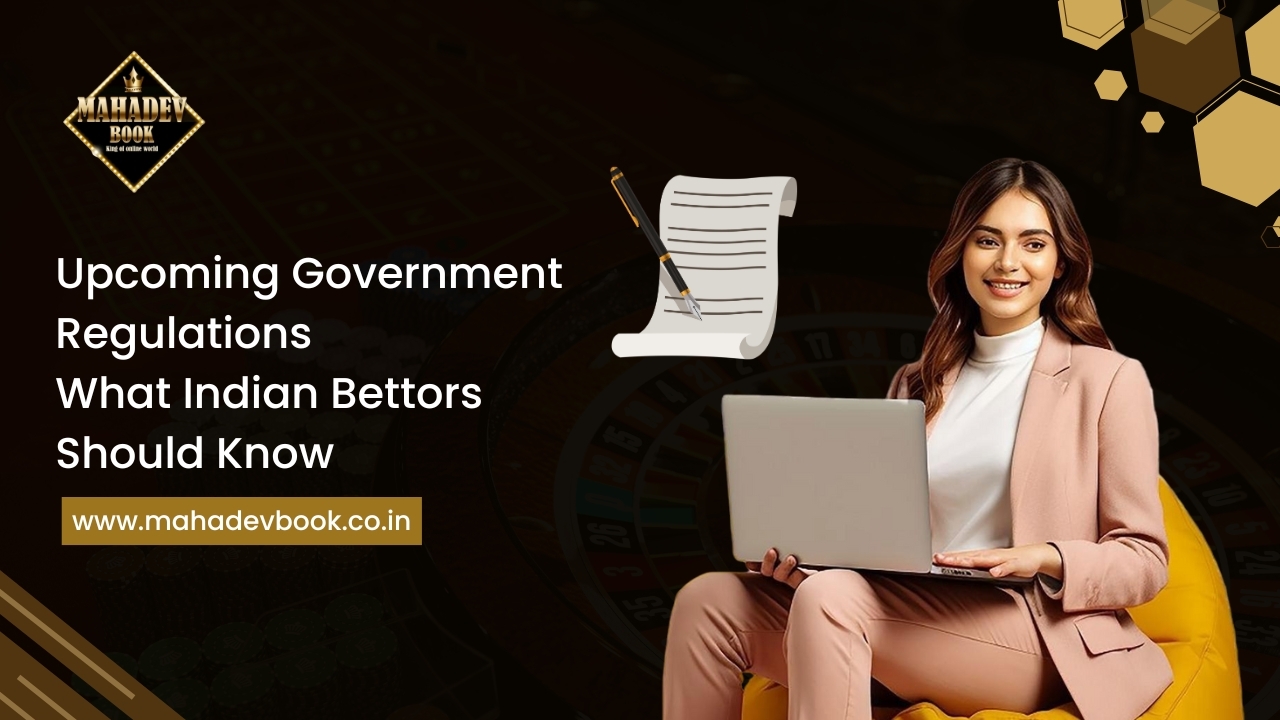Gambling landscape in India is complex, layered, and constantly evolving. Have you ever questioned yourself on what you are legally allowed to gamble on and what you can safely avoid, whether it be online games or casinos? You are not alone. Learning the gambling laws in India is vital to anyone who wants to play or engage in this industry. Through this guide, Mahadev Book will provide a clear and trusted reference of the history, existing laws and state-laws and a prospect of gambling in India.
Understanding India’s Gambling Law Framework
In India, gambling is mostly state regulated and this implies that there could be considerable differences in laws in different states. The Constitution of India gives states the right to control the gambling and betting causes and therefore the rules become patchwork as opposed to one national rule.
On the federal scale, the law that is used as the cornerstone is the Public Gambling Act of 1867. It forbids the operation or the patronage of any gambling house, which is publicly open, but the term is outmoded and does not clearly refer to any online or digital gambling establishment. Consequently the majority of contemporary gambling activities are controlled by state specific laws, licenses and regulations.
Mahadev Book is fully aware of these legalities, and makes sure that it complies with the state and central laws, especially concerning online gaming and betting services.
Distinguishing Key Concepts in Gambling Law
Before diving into state-specific rules, it’s important to understand a few legal concepts that frequently appear in India’s gambling laws:
Skill vs. Chance
One of the central distinctions in Indian law is between games of skill and games of chance. The classification affects whether a particular game is legally allowed:
- Games of skill: Games where knowledge, experience, and strategic decision-making determine the outcome. Courts in India have recognized games like rummy, poker, and fantasy sports as games of skill.
- Games of chance: Outcomes are predominantly random, such as lotteries, dice games, or roulette. These are more strictly regulated or prohibited in many states.
Public Gambling House vs. Private Games
The Public Gambling Act focuses on organized gambling facilities, and thus, personal or friendly games are usually not a subject of the act. Nonetheless, online platforms are usually considered as public facing and this is the reason why platforms such as Mahadev Book require licensing and compliance.
State Sovereignty
Since the states have a power to control gambling, what is legal in one state will be illegitimate in another state. The territorial laws that online platforms should consider to be able to run in many states include geofencing and age verification.
State-wise Gambling Regulations
Goa
Goa is the most liberal state for gambling in India. It allows land-based and offshore casinos, both on cruise ships and in hotel complexes. The Goa government issues licenses and regulates operations under the Goa, Daman & Diu Public Gambling Act. Mahadev Book recognizes Goa as a key state for regulated gaming and ensures compliance for operations involving skill-based and permitted gambling activities.
Sikkim
Sikkim has been progressive in regulating both physical and online gaming. The Sikkim Online Gaming (Regulation) Act, 2008 allows licensed operators to run online casinos and skill-based games for residents within the state. Mahadev Book monitors licensing updates in Sikkim to provide players with safe and legal gaming options.
Nagaland
Nagaland regulates online games of skill under the Nagaland Prohibition of Gambling and Promotion and Regulation of Online Games of Skill Act, 2015. This legislation provides a framework for licensing skill-based gaming operators. Platforms like Mahadev Book operate in line with Nagaland’s rules to ensure legality and transparency.
Other States
- Tamil Nadu and Kerala have restrictions on online gambling, including poker and rummy, although skill games may be permitted under certain circumstances.
- Lotteries are allowed in several states, including West Bengal, Maharashtra, and Kerala, regulated under state-specific lottery acts.
- Many states, such as Gujarat, Uttar Pradesh, and Bihar, maintain a strict ban on most forms of gambling, both offline and online.
Mahadev Book carefully evaluates the legal frameworks in each state to ensure players only access services in compliance with local laws.
Central Government Regulations
While gambling is largely a state subject, the central government has introduced measures that affect online gaming and digital platforms:
Information Technology (IT) Rules
Recent IT regulations require platforms offering online games to:
- Register and obtain licenses from the appropriate authorities.
- Store data, transaction logs, and audit trails within India.
- Implement age verification, responsible gaming measures, and player protection features.
Taxation
India imposes 28% GST on online gaming platforms and 30% income tax on winnings. Operators like Mahadev Book ensure proper tax compliance, both to meet regulatory obligations and to provide transparency for players.
Anti-Money Laundering (AML)
Online gambling platforms must comply with the Prevention of Money Laundering Act (PMLA), maintain KYC records, and report suspicious transactions to regulatory authorities.
Licensing and Compliance for Operators
For any online or offline gambling platform, obtaining the correct license is essential. Licensing requirements vary by state:
- Nagaland: Licenses for online skill games.
- Sikkim: Licenses for online casinos and digital skill-based games.
- Goa: Licenses for land-based casinos.
Operators must also comply with:
- KYC verification to prevent underage gambling.
- Transaction monitoring under AML regulations.
- Secure payment processing via regulated banking channels.
- Data security and server location requirements.
Mahadev Book follows these compliance requirements to ensure players enjoy secure and legal gaming experiences.
Challenges in Indian Gambling Regulation
India’s gambling laws face several challenges:
- Fragmented legislation: Each state has different rules, making nationwide operations complex.
- Legal ambiguity: Terms like “skill” vs. “chance” are subject to interpretation by courts.
- Cross-border issues: Online platforms must ensure users in restricted states cannot access games.
- Tax and compliance burden: High taxes and reporting requirements make operations more demanding.
Mahadev Book addresses these challenges by carefully navigating state-specific laws, maintaining compliance, and prioritizing transparency for users.
Responsible Gaming and Player Protection
Responsible gaming is a core focus for platforms like Mahadev Book. Regulations increasingly require operators to:
- Verify player age and identity.
- Implement deposit and time limits.
- Offer self-exclusion options.
- Provide clear information on game rules and odds.
- Educate players about responsible participation and risks.
These measures protect both players and operators, creating a safe and sustainable gaming environment.
Future Outlook
The Indian gambling industry will probably experience massive developments:
- Unified regulations: The increasing debate is on the central regulatory framework to decrease the state level fragmentation.
- Expanded legal recognition of skill games: Courts and legislatures can still determine the status of the skill-based online games.
- Increased taxation and compliance requirements: The changes in GST, income tax, and reporting requirements are to be expected.
- Technology-driven oversight: Advanced geofencing, identity verification, and data analytics are some of the methods that platforms will most probably use to address regulatory expectations.
Mahadev Book remains on top of these trends, whereby its services are adjusted to meet the most current regulations at all times and to provide a safe and legal gaming experience to all players.
Conclusion
The Indian gambling industry is a controlled but developing market, which is influenced by state-made legislations, country regulations, and online innovations. Players should be aware of the legal system of the state where they play and operators have to be adhered to rigid rules of licensing, taxes, and responsible gambling practices.
Online gaming has been observed to offer a safe platform through which users of the platform can safely enjoy their favorite games so long as the platform is legal, reliable and transparent. By being aware and educating themselves, the players and the operators will be able to engage in the Indian regulated gambling environment with confidence.






